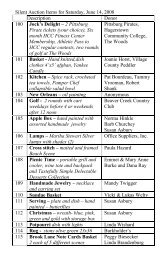Pathways--Holiday 2010 - Brook Lane Health Services
Pathways--Holiday 2010 - Brook Lane Health Services
Pathways--Holiday 2010 - Brook Lane Health Services
Create successful ePaper yourself
Turn your PDF publications into a flip-book with our unique Google optimized e-Paper software.
Continued from page 5<br />
From Our Chaplain<br />
intentionally destroyed any sort of<br />
conditional response to his command<br />
to “love your neighbor.”<br />
As we study the teachings of Jesus<br />
concerning love, He challenges us to a<br />
higher standard of love for neighbor by<br />
including our enemies as those we<br />
should love.<br />
Luke 6:32-36 “If you love those who<br />
love you, what credit is that to you? Even<br />
‘sinners’ love those who love them. And if<br />
you do good to those who are good to you,<br />
what credit is that to you? Even ‘sinners’<br />
do that. And if you lend to those from<br />
whom you expect repayment, what credit is<br />
that to you? Even ‘sinners’ lend to ‘sinners,’<br />
expecting to be repaid in full. But love<br />
your enemies, do good to them, and lend to<br />
them without expecting to get anything<br />
back. Then your reward will be great, and<br />
you will be sons of the Most High, because<br />
he is kind to the ungrateful and wicked. Be<br />
merciful, just as your Father is merciful.”<br />
The kind of “love your neighbor” as<br />
depicted by Christ is loving a person<br />
after he has hurt you. Our natural<br />
response would not be to love someone<br />
who has hurt us, but to retaliate.<br />
Christ commands us to love our<br />
enemies and do good to them.<br />
6 pathways<br />
Later in Luke Jesus also says:<br />
Luke 14:12-14 “Then Jesus said to his<br />
host, ‘When you give a luncheon or<br />
dinner, do not invite your friends, your<br />
brothers or relatives, or your rich<br />
neighbors; if you do, they may invite you<br />
back and so you will be repaid. But when<br />
you give a banquet, invite the poor, the<br />
crippled, the lame, the blind, and you will<br />
be blessed. Although they cannot repay<br />
you, you will be repaid at the resurrection<br />
of the righteous.”<br />
We are to give without expecting<br />
anything in return. That is true love<br />
for neighbor.<br />
Do we as Christians actually love our<br />
neighbor like this? Do we give to those<br />
who cannot repay us? To those who<br />
would harm, if they could, or those who<br />
have already done you harm; do you<br />
love them as Christ loved you?<br />
Our Lord Jesus Christ set the standard of<br />
true love by which we now should<br />
measure our ability to love. To “love our<br />
neighbor” is to love not only the person<br />
that might be easy for us to love, but to<br />
love our enemies, those who have<br />
harmed us, those who cannot repay us,<br />
and even those who quite possibly stand<br />
at the total opposite end of everything<br />
we believe. To love in these stretching<br />
ways is to “love our neighbor” and to<br />
truly love Christ. �





